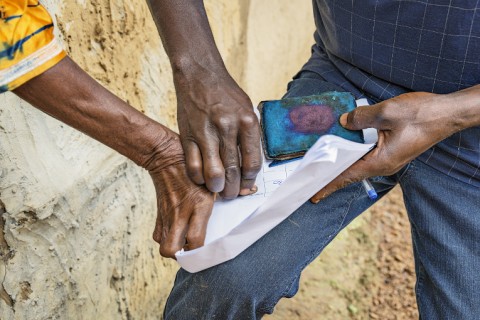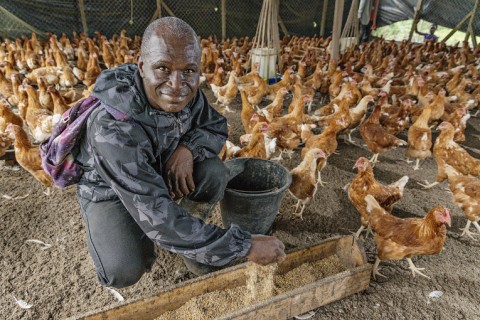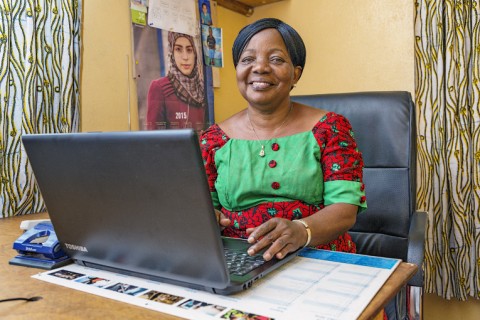Egg production recovering in Liberia after Ebola outbreak
Egg production is recovering in Liberia. With the Ebola epidemic over, Liberians finally get to put to use what they’ve learned from Finland.
Mambah-Kaba, Liberia. Thirty confused chickens cluck onboard a jeep. They are headed from a poultry farm to the nearby village of Frozohn in Margibi County, Liberia.
Sundaymai Johnson has been waiting for this day. She has fixed her wood and clay hennery with care, and prepared the bedding straw according to instructions.
”I am very pleased to get new chickens”, Johnson says.
It is with good reason that egg is called the symbol of a new beginning in Liberia.
Ravaged by brutal civil war in the 1990s and early 2000s, Liberia is extremely dependent on imported food. Over half of rice, which is used as the basic food product, comes from abroad.
The share of imported eggs is over 90 percent. Eggs are imported to the West African cape from Mexico and Ukraine. They may be months old by the time they arrive.
The people of Frozohn gather around to watch the chickens being handed over.
”My little chickens, I cannot speak English to you, but I will speak the Bassa language, cluck-cluck-cluck”, Johnson chuckles holding a chicken under each arm.

Sundaymai Johnson signs out the chickens with a fingerprint. Approximately 43 percent of the Liberian population over 15 years old is literate. Photo: Ville Palonen
Small organisation is a major egg producer
The six-month-old chickens are given to Johnson by a Liberian NGO, Project New Outlook (PNO). The organisation hands these chickens out mainly to widows and single mothers, to start out henneries.
The goal is to improve the livelihood of women, and by extension, entire families.
PNO buys eggs from the women and delivers them for sale to the supermarkets in the capital city Monrovia.
In 2014, this small organisation produced as much as a few percent of all eggs in Liberia. Its main poultry farm was home to 10,000 chickens at its best.
Then Ebola broke out.
The Liberian government closed borders for months and restricted movement inside the country.
Import of chicken feed from neighbouring Guinea halted and chickens couldn’t be fed regularly. Base ingredients of chicken feed were also unavailable, as they, too, are mainly imported.
Johnson had to set her chickens free to search for food on their own. Some of the chickens died, some Johnson ate or sold.
Chickens improve livelihoods in rural areas
Now, 2,000 chickens brought from Guinea in June scuttle around the poultry farm.

Project coordinator David S. Dianue Sr. is responsible for training the women on how to feed and take care of chickens, and forms networks with other egg producers. Photo: Ville Palonen
In October, 30 women received 30 chickens each from the organisation. PNO is hoping egg deliveries to the supermarkets can be restarted soon. In Liberian conditions, that is no simple task.
”Particularly during the rainy season roads are in poor condition. Eggs have to be packaged well and transported carefully on jeeps to the main road. So far, not a single egg has broken despite the bumpy ride”, says Beatrice Togba Wuo, Director of PNO.
Organic production lessons from Finland
Even in Liberia, egg production is more than just taking care of chickens and selling eggs. Lessons on branding and organic production were retrieved from an organic poultry farm in Finland.

”We are going to learn how to make chicken feed ourselves. That way we can make purer, more nutrient and cheaper feed”, says Beatrice Togba Wuo, Director of PNO. Photo: Ville Palonen
”We sell the eggs in large cartons. We would get a better price if we could pack the eggs into smaller egg flats and sell them with our own brand”, Togba Wuo says.
”We want to raise the number of chickens in a single family unit to 100–200. Thus, sale of the eggs would provide the women with enough income to purchase new chickens when the old ones stop laying eggs.”v
The fragile state of Liberia
- Ranks 175th of 187 on the Human Development Index.
- The fragile state suffered from civil war in 1989–1996 and 1999–2003.
- 84% of the population living with less than 1.25 USD a day.
- Population of 4.3 million.
- An estimated 60 percent of workforce in agriculture.
- Main export items: rubber, cocoa, palm oil.
Sources: UNDP, FAO
The chickens are exploring their new home. Water and feeding bowls in Johnson’s hennery are similar to those at the poultry farm. That will hopefully speed up the adaptation of the chickens.
”With the sales from the eggs, I can buy school uniforms for my grandchildren, food for my family and sandals”, Johnson explains.
The poultry farm project in Liberia is supported by the Women’s Bank. The project is implemented by Finn Church Aid with its local partner, Project New Outlook (PNO).
Text: Minna Elo Photos: Ville Palonen